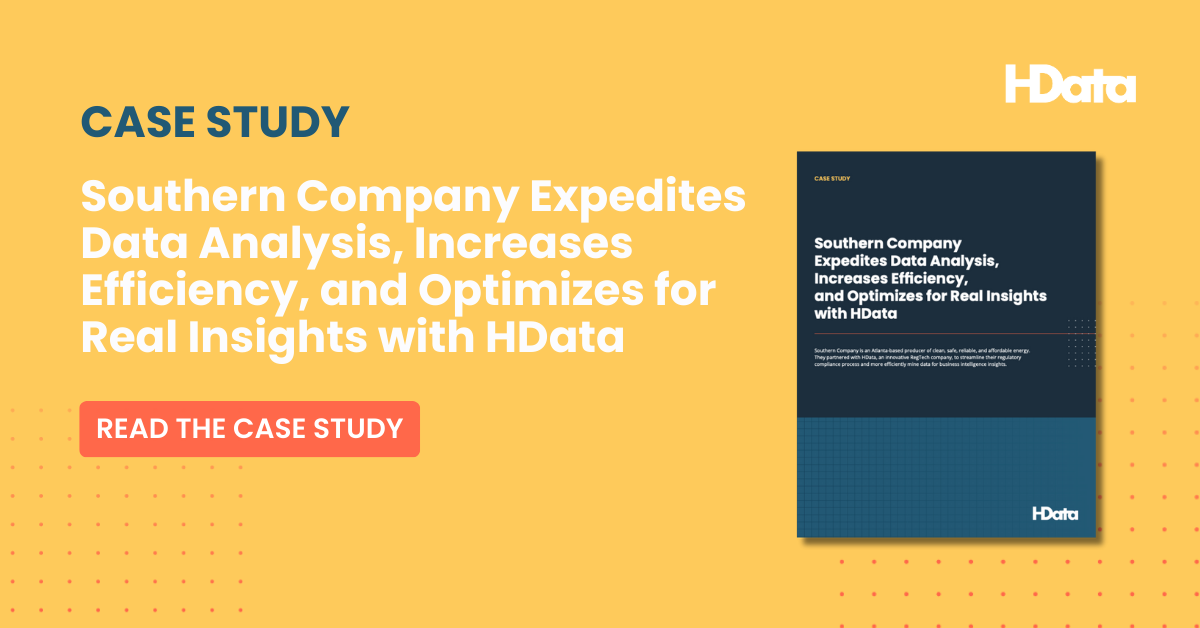Customer Quotes from LET’S GO! 2023
As you may have previously read, last month we had the pleasure of hosting colleagues, customers, prospects, and industry peers at our annual LET’S GO! event in Birmingham, Alabama. Some of the liveliest discussions we hosted that week took place during our customer panels.
One expert group got into a nitty-gritty discussion about what it really means to integrate artificial intelligence into the management of energy regulatory data. HData’s Regulatory AI technology makes HData the first platform in history to use generative language models to respond to queries about energy regulatory information. Using Regulatory AI, you can instantly summarize a docket, extract a few bullet points from a hundred pages of text, or absorb the meaning of a series of detailed tables.
We asked our customers to tell us how they plan to use HData’s Regulatory AI and what it means for the future of energy regulatory work. Read on for 3 facts and 1 fear that surfaced in our conversation.
Panel participants were:
- Andy Denato - Assistant Corporate Controller, CMS Energy
- Joe White - Director, Intrastate Regulatory Affairs Energy Transfer
- Britt Cohen - HData Director of Customer Success, Discussion Facilitator
FACT: Artificial Intelligence Can Help Drive Innovation from Regulatory Data
ANDY: “Thinking about renewables and things like that - how you get it all connected to the grid, those interconnections, and the siting - where’s the best place for all those things? There’s a lot at stake in the industry, a lot to be gained in terms of developing the most efficiency from the available data.”
ANDY: “HData has been very efficient, it’s helped us perform analysis much faster and glean a lot of insights from it.”
FACT: Artificial Intelligence Can Help Teams Do More with Less
JOE: “What it does, it allows us to leverage our current headcount much more effectively. Frankly, headcount is a problem. We have a large number of openings at Energy Transfer. It’s a competitive environment out there [in terms of attracting talent]. Things like HData help us leverage our current footprint. And a lot can be done with HData to provide metrics that at least at ET we have yet to scratch the surface on and we can develop that in a meaningful way.”
ANDY: “We’re feeling cost pressure, for sure. We’re continuing to go down in terms of headcount and then there’s labor costs. But I view HData as a value add. It’s one of those things that can help us not only with compliance and all that, but we can provide more value with the same number of people. We’ve been able to show that, we’ve been able to produce that value without adding more resources. The return on investment is the value adding piece.”
BRITT: “I know we’ve all probably been in a situation where we felt like we had to do something that would take forever, and we needed it tomorrow morning because someone asked for it last minute. I feel like the use of AI is probably one of the first tools that makes that maybe even possible now. I don’t propose we all work on last-minute requests all the time, but we are only human. It will be nice to have some machine help.”
FEAR: There’s Still a Lot of Uncertainty About AI
JOE: “I think it’s fair to say there’s a lot of nervousness about AI. We're concerned about quality integration, if you get stuck in some kind of do-loop that has bad data in it, we’re very concerned about how that’d be managed going forward.”
ANDY: “I think there’s a lot of misconceptions about it, too. I think in the employee base there’s a lot of fear: ‘ is this going to take my job?’ I view it as like that copilot concept, it’s going to come alongside and help us. That’s how I view it and a lot of our team does, but I think there’s that fear factor there about how disruptive it is to the labor force.”
BRITT: “That’s one thing [HData Co-Founder and Chief Technology Officer] Yuval [Lubowich] highlights a lot: The universe our bot is trained on is limited on purpose for those security and quality reasons.”
[NOTE: Read more from Yuval here.]
FACT: Everyone Is Curious About What Will Happen Next
ANDY: “I think what HData is doing with Regulatory AI is really interesting. It could be very interesting to … a regulatory legal team, the small group of lawyers who’s handling all our cases, handling all our rebuttals, handling interveners, multiple filings - I could see something like that being valuable to a team like that. It’s early days, but we’re very interested. It’s top of mind right from the board level to the technology team to the finance team, all the way through the company.”
ANDY: “It’s been a hot topic for us, especially over the past few months. We’re in that learning phase about what AI is going to do and what it’s not going to do.”
Overall it was a fascinating discussion about what’s already happening with artificial intelligence in energy regulatory data management, what people are afraid might happen, what education still needs to take place in the industry about what are (and aren’t) actual risks, and what we all stand to gain from new tech.
With Regulatory AI added, HData is creating a whole new way to file, explore, analyze, and leverage your regulatory information. By adding the ability to create your own Private Catalog of queryable documents, HData is working hard to build a secure and accurate AI tool that our customers can feel great about using.
Are you curious about the role of artificial intelligence in data management for regulated and regulating bodies? Request a copy of our ebook to learn more.


